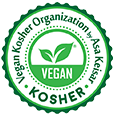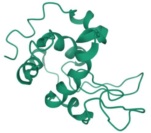




Schematic diagram of the protein structure of lysozyme
Appearance
Pale yellow powder.
Mechanism of Action
Bactericidal mechanism: As a glycoside hydrolase, it mainly destroys the β-1,4 glycosidic bond between N-acetylmuramic acid (NAM) and N-acetylglucosamine (NAC)
on the cell wall of bacteria.
Antiviral mechanism: it can directly combine with negatively charged viral proteins, and form double salts with DNA, RNA, and apoproteins, thereby inactivating the virus. In addition, by activating the body's immune system, it regulates the cytotoxicity mediated by lymphocytes and macrophages to kill viruses.
Enzyme Activity Definition
Lysozyme can hydrolyze the cell wall of bacteria, causing Micrococcus luteus dissolution and reducing the absorbance value of its suspension.
At pH 6.2 and 25°C, the amount of lysozyme required to cause the absorbance change of Micrococcus luteus suspension by 0.001/minute at 450 nm is one enzyme activity unit (U).
Application Field:
1.Food
Application in dairy products:
In infant food and milk powder, lysozyme is a non-specific immune factor of the human body, which has a special effect against intestinal spoilage bacteria.
Application in cheese production:
As a preservative, it inhibits butyric acid fermentation caused by contaminating bacteria, and prevents the late-stage foaming of cheese.
Preservation of aquatic products, meat, fruits, and other products:
Spraying lysozyme on aquatic products or meat can play a role in preservation and anti-corrosion.
Application in pastries and beverages
Lysozyme prevents microbial growth, especially in pastries containing cream.
2.Medicine
It has bactericidal and anti-inflammatory effect, and has a strong anti-inflammatory effect on inflammation caused by microbial infection; Protect the intestinal micro-ecological environment and enhance the intestinal anti-infection ability; Clinical diagnosis, etc.
3.Daily Use Chemicals
toothpaste and cosmetics, with antibacterial and anti-inflammatory effects.
Recommended Dosage
Recommended dosage: 15-500ppm.
For specific dosage please determine by experiments.
Storage and Shelf Life:
12 months when stored in a cool, dry and ventilated place with original container unopened, protect against light.
Packing: 15KG/Carton